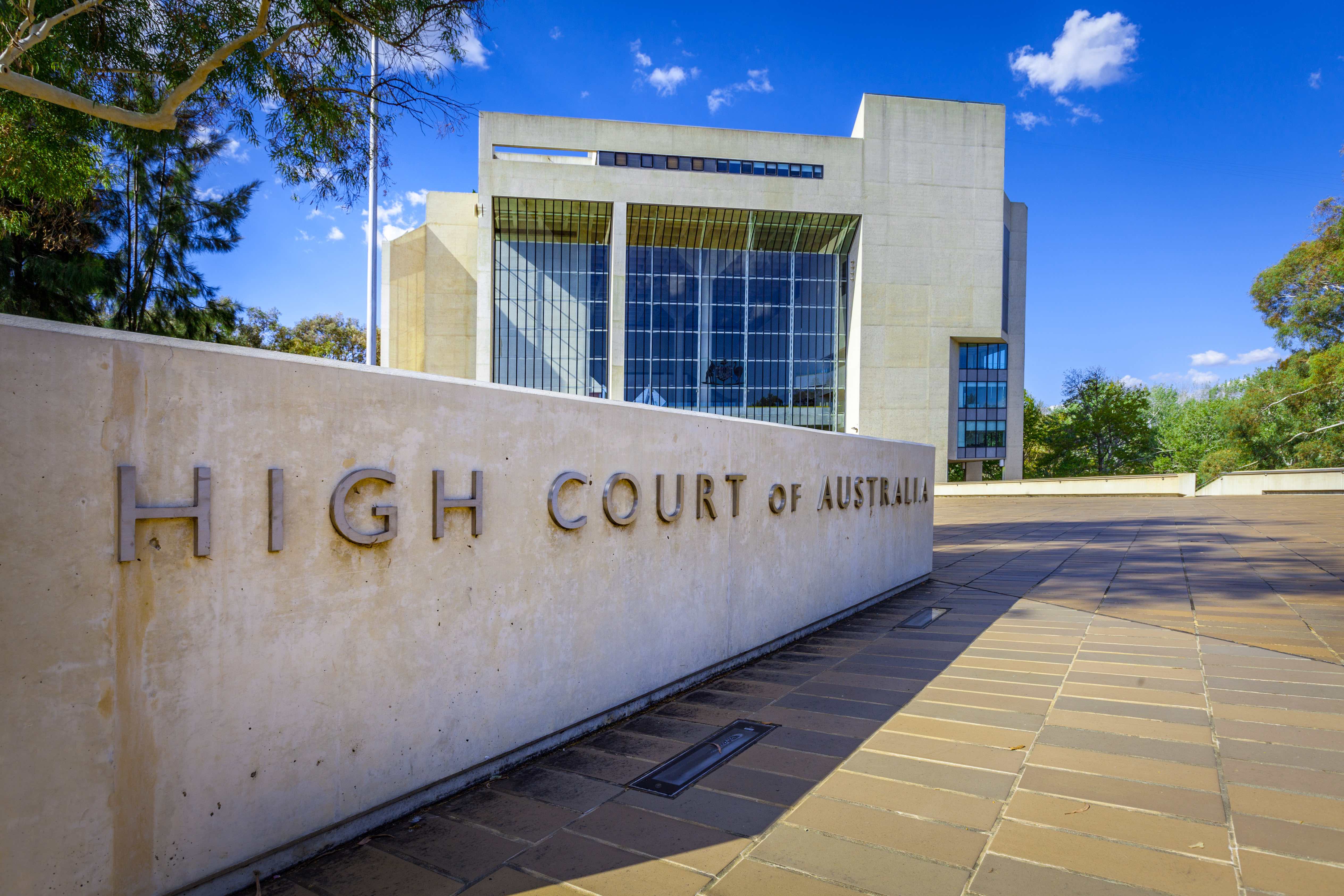High Court. Were the conditions in cll 070.612A(1)(a) and (d) of Schedule 2 to the Migration Regulations 1994 (Cth) prima facie punitive? If so, can it be said that there is no legitimate non-punitive purpose justifying the powers, with the result that such powers should be characterised as punitive and therefore as infringing on the exclusively judicial power of the Commonwealth in Ch III of the Constitution?
Under rr 2.20(1) and (18) 2.25AB of the Migration Regulations 1994 (Cth), a non-citizen is within a prescribed class for the grant of a bridging visa and is taken to meet criteria prescribed for the grant of a BVR without application if there is no real prospect of removal of the non-citizen from Australia becoming practicable in the reasonably foreseeable future.
The plurality of the High Court (HCA) said:
-
- Clause 070.612A(1) of Sch 2 to the Migration Regulations provides that, if a BVR is granted to such a non-citizen:
"each of the following conditions must be imposed by the Minister unless the Minister is satisfied that it is not reasonably necessary to impose that condition for the protection of any part of the Australian community ...:
(a) 8621;
(b) 8617;
(c) 8618;
(d) 8620."
-
- Clause 070.612A(2) requires the Minister to decide whether to impose each of the conditions listed in cl 070.612A(1) in the order in which they are listed.
- By operation of s 76E of the Migration Act, the rules of natural justice do not apply to the making of a decision to grant a BVR under s 73 of that Act if the BVR is granted subject to one or more of the conditions listed in cl 070.612A(1) of Sch 2 to the Migration Regulations.[47] Instead, if the Minister makes a decision to grant a BVR subject to one or more of those conditions, the Minister must give notice of the decision to the non-citizen and invite the non-citizen to make representations.[48] The Minister must then grant a further BVR that is not subject to one or more of the conditions if the non-citizen makes representations in accordance with the invitation and "the Minister is satisfied that those conditions are not reasonably necessary for the protection of any part of the Australian community".[49]
- The content of each of the four conditions listed in cl 070.612A(1) is set out in Sch 8 to the Migration Regulations.[50] Although only the conferral of authority to impose the first and the fourth of those conditions is impugned, the content of the other two conditions is important to the context within which the command of cl 070.612A(1) – that each condition listed "must be imposed by the Minister unless the Minister is satisfied that it is not reasonably necessary to impose that condition for the protection of any part of the Australian community" – is to be construed. The content of each of the four conditions therefore needs to be and is noted in the order in which the four conditions are listed in cl 070.612A(1).
- The condition listed in cl 070.612A(1)(a), the monitoring condition, is as follows:
"(1) The holder must wear a monitoring device at all times.
(2) The holder must allow an authorised officer to fit, install, repair or remove the following
(a) the holder's monitoring device;
(b) any related monitoring equipment for the holder's monitoring device;
the holder must notify an authorised officer of that as soon as practicable.
(5) In this clause:
-
- The condition listed in cl 070.612A(1)(d), the curfew condition, is as follows:
"(1) The holder must, between 10 pm on one day and 6 am the next day or between such other times as are specified in writing by the Minister, remain at a notified address for the holder for those days.
(2) If the Minister specifies other times for the purposes of subclause (1), the times must not be more than 8 hours apart.
(3) In this clause:
notified address for a holder for a particular day or days means any of the following:
(a) either:
(i) the address notified by the holder under condition 8513 [which provides that the holder 'must notify Immigration of his or her residential address within 5 working days of grant']; or
(ii) if the holder has notified another address under condition 8625 [which provides that the holder 'must notify the Minister of any change in ... an address of the holder ... within 2 working days after the change occurs'] – the last address so notified by the holder
(b) an address at which the holder stays regularly because of a close personal relationship with a person at that address, and which the holder has notified to Immigration for the purposes of this paragraph
(c) if, for the purposes of this paragraph, the holder notifies Immigration of an address for that day or those days no later than 12 pm on the day before that day or the earliest day of those days (as the case may be) – that address."
-
- Non-compliance with a curfew condition imposed on the grant of a BVR is an offence against s 76C of the Migration Act. Non-compliance with a monitoring condition of a BVR is likewise an offence against s 76D of the Migration Act. Each offence is punishable by a maximum penalty of five years' imprisonment or 300 penalty units, or both,[57] subject to s 76DA of the Migration Act which provides that if a person is convicted of such an offence the court must impose a sentence of imprisonment of at least one year.
Some of the questions to the HCA were as follows:
Question 1: Can, or does, the power conferred by s 504 of the Migration Act 1958 (Cth) extend to the making of a regulation which would transgress a constitutional limit on the legislative power of the Commonwealth Parliament?
Question 2: Was the curfew condition in cl 070.612A(1)(d) prima facie punitive?
Question 3: Was the monitoring condition in cl 070.612A(1)(a) prima facie punitive?
Question 4: May a law conferring a power bear the character of being prima facie punitive but be valid if the law is reasonably capable of being seen to be necessary for a legitimate and non-punitive purpose?
Question 5: Do both s 3A(1) of the Migration Act and s 15A of the Acts Interpretation Act depend on cl 070.612A(1) being reasonably open to construe the provision, in some application, as within constitutional limits, in which event cl 070.612A(1) has that more confined meaning and operation in all its applications?
Question 6: If the answers to Questions 2 and 3 are 'yes', can it be said that there is no legitimate non-punitive purpose justifying the powers, with the result that such powers should be characterised as punitive and therefore as infringing on the exclusively judicial power of the Commonwealth in Ch III of the Constitution?
Question 7: Would it "reduce the separation of powers to ritual formalism if a rigid line were drawn between, on the one hand, restrictions on an offender's liberty due to the past commission of a crime and, on the other hand, restrictions on an offender's liberty due to the past commission of a crime leading to the anticipated future commission of a crime"?
The HCA answered those questions as follows:
The remainder of this article is only available to Case Law and Platinum subscribers.
Read our Terms & Conditions and upgrade below:
Monthly Subscriptions
Annual Subscriptions
Where GST applies, the above amounts are inclusive of GST.
Content Types
Basic Content includes basic news, some media articles and selected announcements.
Premium Content includes all our content, except for Case Law Content. In other words, it includes Basic Content, plus all our articles on legislative and policy changes, industry updates and the Migration Legislation Tracker.
Case Law Content includes Basic Content, plus case law summaries, analysis and extract, but does not include Premium Content.
Platinum Content includes Basic Content, plus Premium Content, plus Case Law Content. In other words, it includes ALL our content.
If you already have a Case Law or Platinum subscription, click on 'Login' below.











